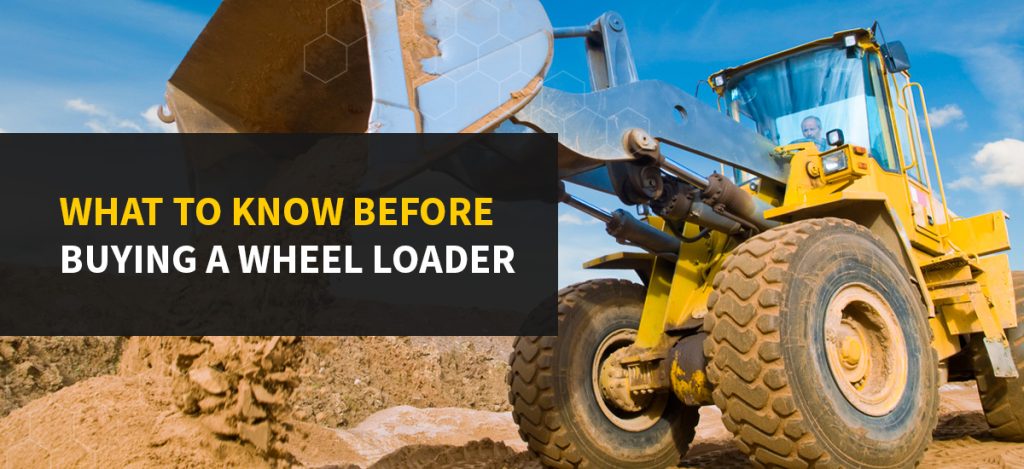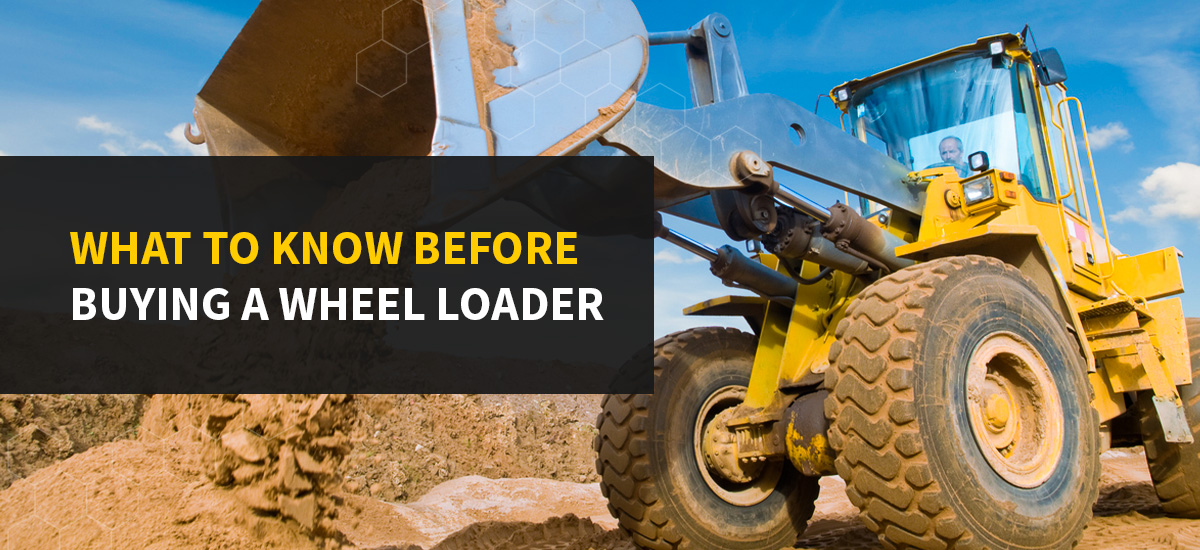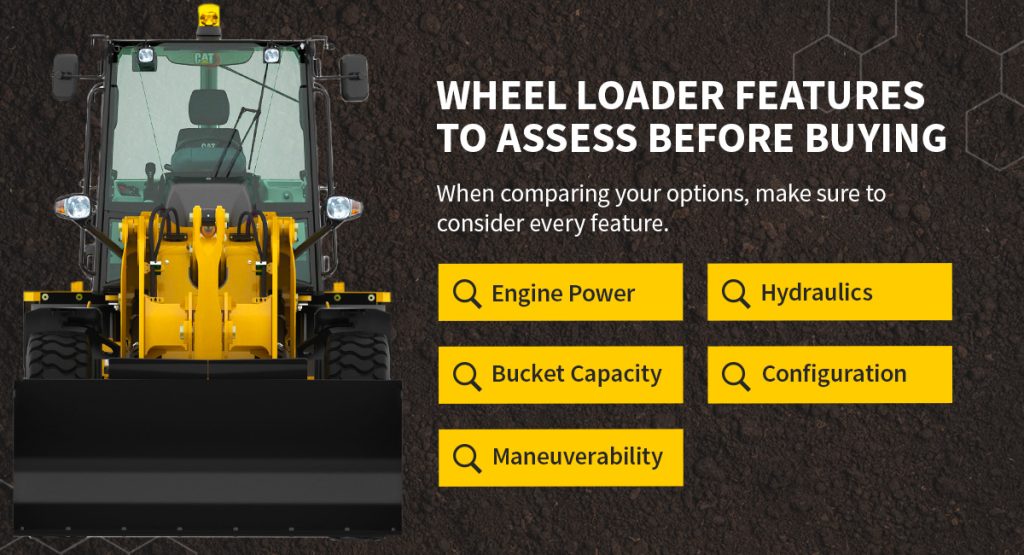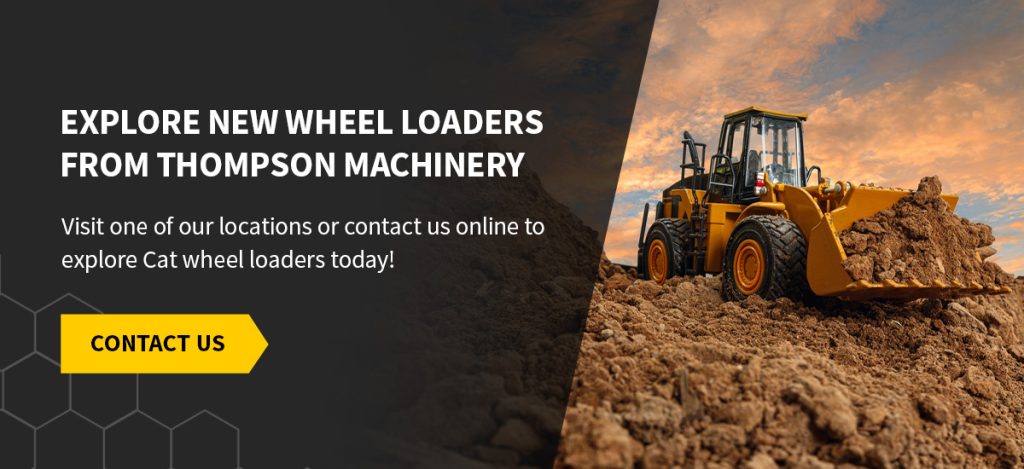
Wheel loaders are among the most important heavy-duty pieces of equipment on a jobsite. They’re versatile and powerful, helping industries like construction, agriculture, and landscaping get projects done efficiently.
Whether you are looking to fill a gap in your fleet with a short-term rental or you want to expand your equipment lineup with a new or used wheel loader, Thompson Machinery can help. Explore our wheel loader guide and discover the key considerations for getting the right model for your applications below.
What Is a Wheel Loader?
Wheel loaders are heavy-duty machines designed to lift and move materials. They have a front-mounted bucket and wheels instead of tracks that give them excellent traction and maneuverability on different jobsites.
This equipment features hydraulic arms capable of scooping, lifting, and transporting large amounts of materials like snow, dirt, and gravel. Bulk material movement means wheel loaders are a fast, multipurpose tool that can significantly reduce labor demands on projects.
Some common uses of wheel loaders include:
- Scooping and loading materials.
- Clearing debris.
- Stockpiling loose aggregates.
- General site cleanup.
- Moving agricultural products.
- Snow removal.
Types of Wheel Loaders
An introduction to wheel loaders is incomplete without understanding the different types. The wheel loader you get affects efficiency, budget, storage, and projects. Ensure you are exploring the different sizes and configurations to narrow down your options. The three main wheel loader categories include:
- Compact wheel loaders: Lightweight and extremely maneuverable wheel loaders. Use compact models for landscaping, small construction sites, and agricultural work in limited spaces.
- Midsized wheel loaders: Midsized models are popular with general contractors. They perfectly balance mobility and lifting. Use midsized models for medium-duty earthmoving and material handling tasks.
- Large wheel loaders: Large units are designed for quarries, mines, and large-scale infrastructure projects. They have reduced mobility compared to smaller models, but they maximize horsepower, reach, and bucket capacity.
Wheel Loader Features to Assess Before Buying
When comparing your options, make sure to consider every feature. A wheel loader’s engine power, bucket capacity, and other systems will affect efficiency.
1. Engine Power
Horsepower determines how effectively the loader can lift heavy loads, operate attachments, and perform over long days. Higher horsepower means faster work and easier operation in tougher conditions.
If there’s too little horsepower, the equipment might not perform adequately or safely with the necessary attachments.
2. Bucket Capacity
Bucket capacity directly affects how much material you can move with each load. Larger buckets will move more material at once, reducing the trips needed. However, oversized buckets can create equipment instability. Buckets must fall within the loader’s safe operating weight to protect the operator and equipment.
That’s where lift height and tipping load come in. These specifications tell you how high the bucket can reach and how much weight the machine can carry before losing stability.
3. Maneuverability
Your wheel loader will depend on your worksite, too. Larger models are less maneuverable. They will haul heavy loads but struggle on narrow worksites. On the other hand, smaller units will turn tightly, making them perfect for congested or narrow areas.
4. Hydraulics
Hydraulic flow will also affect performance. Standard-flow hydraulics can handle basic wheel loader attachments. High-flow systems are essential for demanding work like snow blowing and mulching.
Additionally, look at linkage systems. Traditional Z-bar linkages offer better breakout force for digging, while parallel-lift linkages provide better visibility and control for fork work.
5. Configuration
Size and configuration matter with wheel loaders. A unit’s configuration affects its mobility, stability, and use. Options include:
- Articulated wheel loaders: Articulated models have a central pivot point that allows for tighter turns.
- Rigid-frame: These loaders have additional stability and durability on open terrain.
- Specialty: Specialty options like high-lift models and tool carriers are designed for different attachments and unique tasks.
Matching Wheel Loaders to Your Needs
Wheel loader selection goes beyond price and brand. What exactly do you need to tackle projects faster and achieve higher quality results? Find a machine built for your worksite by looking at:
- Terrain and layout: What kind of site will you be at most often? Tight city sites or barns call for compact loaders and maneuverability. Larger construction sites and quarries can accommodate bigger machines with higher horsepower.
- Operator skill: More advanced wheel loaders with specialized purposes, complex controls, or high-flow attachments need trained, expert operators. If your operators are less experienced, you should invest in a machine with intuitive controls and easier handling to keep everyone safe and efficient.
- Functionality: Buckets, forks, grapples, and snowplows make a wheel loader more versatile, but only if it has the hydraulics and lift capabilities to handle them. Make sure the wheel loader supports the attachments you’ll use the most.
- Features: Lift height, tipping load, and engine power must match your main tasks. A machine that’s too small will slow down productivity, while an oversized unit can balloon your budget unnecessarily.
Buying vs. Renting Wheel Loaders
Once you know what type of wheel loader you want, it’s time to decide between buying and renting.
Buying
Your budget, work schedule, and storage space are essential to know before buying a wheel loader.
Buying makes sense if you use the machine often or need a model customized to your applications. Ownership is more expensive upfront, but you get a long-term return on your investment. A well-maintained machine can last you years.
If buying new is too expensive, you can also buy used equipment to lower costs significantly.
Renting
Renting gives you more budget flexibility and offers greater convenience for short-term or seasonal projects. You don’t have to pay for maintenance or long-term storage, either.
Some suppliers even offer lease-to-own plans to help spread costs out over time. Make sure to consider the total cost of ownership, resale value, maintenance, fuel, and operator training to find the best wheel loader for your work.
Explore New Wheel Loaders from Thompson Machinery
Finding the right wheel loader can make all the difference in productivity and safety. Whether you need a compact wheel loader or a high-capacity machine for heavy-duty work, Thompson Machinery has the knowledge and inventory to help.
Our team can walk you through every option, ensuring you get a wheel loader with the features, attachments, and specifications best suited to your needs. We carry the latest Cat® wheel loaders, all built for durability, performance, and versatility. We also back every machine with unmatched service and support.
We’re here to support your business with flexible financing options and maintenance programs designed to extend equipment life. Visit one of our locations or contact us online to explore Cat wheel loaders today!





